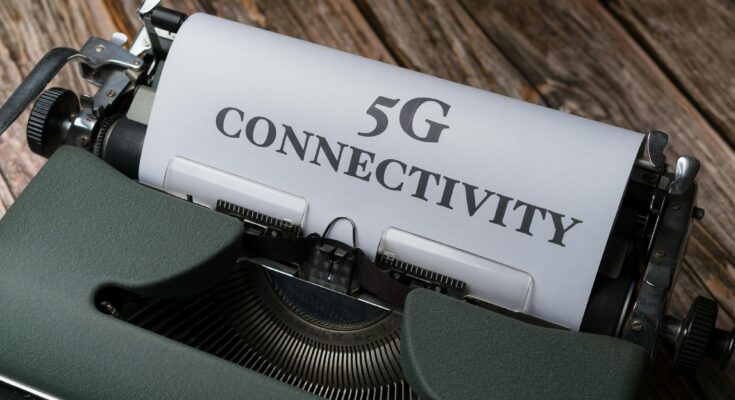Overview
Faster speeds and reduced latency of 5G technologies are fundamentally transforming connectivity. The forthcoming wireless network generation, 5G, will transform whole sectors including daily communication. Faster data transfer speeds enable smart gadgets to connect without any problems. Smart cities, healthcare, and companies will all benefit from higher efficiency. Real-time data transfer and enhanced dependability will enable the Internet of Things (IoT) blossom. Consumers will have access to premium streaming and instant downloads. It is expected that the launch of 5G networks would inspire creativity and economic growth. Still, issues like infrastructure development and security questions have to be addressed. Knowing the implications of 5G helps companies and people to better make future plans. The advantages, challenges, and applications of 5G technology are discussed in this paper. At the end you will see how 5G is shaping future connectivity.
Lessened latency and faster speeds
One of main advantages of 5G technology is its incredible speed. Speeds of 5G range from 100 times quicker than those of 4G. Users may thus download movies, games, and other data in a few seconds. Less latency guarantees little delay in real-time communication. Businesses, doctors, and gamers all benefit from ultra-responsive connections. Video conferences and virtual meetings will start to be more consistent and smoother. 5G networks allow remote work and digital cooperation. Faster speed improves cloud computing and remote storage access as well. Companies can more efficiently handle big volumes of data. Faster speeds will allow autonomous automobiles to also communicate instantaneously. AR and VR will get ever more immersive. Reduced latency and real-time communication allow smart devices to interact Five G’s speed and reactivity will alter digital experiences across sectors.
5G’s Role in Urban Planning
Smart cities cannot function without connection, so 5G will be absolutely vital. Faster data flow will improve planning and urban management. Traffic control systems will leverage real-time data to help to reduce congestion. Tracking and smart planning will maximize public transportation. Smart grids will examine consumption trends and raise energy efficiency. 5G’s automated systems and networked sensors help to enable better garbage management. Instant communication will boost the efficiency of services related to emergency response. High-speed internet availability in cities will assist to close the digital divide. Security systems will employ 5G and artificial intelligence to more rapidly identify threats. By means of smart buildings, carbon footprints will be lowered and energy consumption optimized. Data collection in real time will support environmental monitoring. Applications for smart cities will raise urban living standards and sustainability. The creation of smart cities depends on 5G’s general acceptance.
Five Gbps and the Internet of Things (IoT)
The Internet of Things (IoT) ties devices together to boost efficiency and automation. 5G technology enhances IoT by allowing connections faster and more dependability. Smart homes will include flawless device-to—-device connection. Wearable technologies will provide real-time health monitoring including instantaneous updates. Industrial IoT will help supply chain management and production to be better. Autonomous automobiles will negotiate securely using IoT and 5G. Smart agriculture will allow irrigation to be automated and soil conditions watched. In many different sectors, linked devices will boost output. Thanks to 5G IoT networks can allow more connected devices without lag. Companies will apply IoT and 5G to boost operational efficiency. Better connection will drive creativity in home automation. Data processing real-time from IoT devices driven by artificial intelligence will revolutionize whole industries. 5G and IoT will together produce a smarter, more linked world.
5G Applied in Medical Practice:
The healthcare sector is supposed to be transformed by the arrival of 5G technologies. Faster connectivity will raise the telemedicine’s efficacy. Robotic assistance during distant surgeries will improve patient results. Diagnostics driven by artificial intelligence will quickly evaluate medical data. Doctors and patients will find it simpler with 5G to interact instantly. Wearable medical technologies will provide constant, exact monitoring. Emergency response teams getting real-time updates will raise survival rates. Medical devices linked will enable hospitals run more effectively. Patient privacy and data security have to take the stage with 5G. AI based medical imaging will yield faster and more accurate diagnosis. 5G will improve remote places’ access to healthcare. Health research would gain from faster data interchange and analysis. Future healthcare will depend on 5G to boost accessibility and efficiency, therefore enabling the development of the sector.
5G and Future Workplace Architecture
The evolving workplace will depend critically on 5G technologies. Fast connectivity will help remote work to be more successful. Virtual meetings will include greater video quality and fewer lag. 5G networks will speed up and guarantee dependability of cloud computing. Companies will turn to AI-driven automation to boost output. 5G will enable training apps leveraging virtual and augmented reality. Real-time communication will raise the efficiency of technology for cooperation. Edge computing will let companies handle data closer to the source. The growing 5G network calls for changing cybersecurity protocols. Businesses will invest money on 5G-enabled technologies to guarantee seamless operations. Employees will have better digital tools for distant cooperation at hand. Faster data transfers will raise flow efficiency. Future companies will be networked, flexible, and more effective.
Difficulties and Security Concerns
5G technology has certain disadvantages even if it offers advantages. Building infrastructure calls both a lot of money and work. There are more security flaws the more gadgets linked to the network. The massive data harvesting begs privacy concerns. More complex cyberattacks could follow from better connectivity. Maintaining the safe implementation of 5G depends on establishing regulatory structures. Network coverage has to be enlarged if equal access is to guarantee. Device compatibility issues can stop more general acceptance. These problems have to be handled if the 5G deployment is to be effective. Governments and businesses have to cooperate if we are to raise security levels. Cybersecurity solutions backed by artificial intelligence will help to guard 5G networks. Development of 5G depends on the resolution of infrastructure and security concerns. A dependable and safe network is really crucial if 5G is to be generally embraced.
Economic Effects of 5G
The rollout of 5G technology will quicken world economic growth. Industries’ output and efficiency will rise. Modern networking will open fresh commercial opportunities. The tech sector will produce more jobs in artificial intelligence and network building. Faster transactions and payment processing of 5G will help e-commerce. Through smart manufacturing, output will be maximized and costs will be lowered. Monitoring real-time will improve transportation and logistics. Small businesses would benefit from better digital tools and automation. The demand for services linked to 5G will stimulate investments in innovation. Governments will support infrastructure projects if they help to hasten rollout. Five-G and artificial intelligence will drive innovations in many different companies. The financial benefits of 5G will be appreciated in many different sectors. The future’s economy will be shaped by the great application of 5G technologies.
Five’s Prospect and Beyond
A new connected era is just beginning with 5G. Technology of communication will keep developing and challenge its boundaries. Currently in research on 6G networks to raise speeds is AI will continuously be improving the 5G networks’ optimization. Based on space, 5G technologies could provide global coverage. Edge computers will reduce latency and improve real-time processing. Thanks to quantum computing, data encryption for safe communication might see a revolution. Driven by artificial intelligence, companies will continuously generating fresh concepts for 5G apps. Smart cities will grow depending on next-generation connectivity. Autonomous cars’ future depends on extremely fast networks. New businesses exploiting 5G’s full potential will emerge. Future advances need for public and business sectors working together. The growth of connection will help to form next generations. As we passed 5G, even more technological advancements are expected.
Final notes
5G technology, with lower latency and faster speeds, is redefining communication going forward. Better digital experiences will help companies, customers, and businesses all around. Growing IoT, smart cities, and AI-driven apps will speed innovation. Infrastructure and security problems abound, but solutions are under development. The consequences of 5G on society and the economy will just grow more. Knowing 5G’s possibilities helps businesses and people to better get ready for change. Future transportation, healthcare, and the workplace will all be profoundly affected by 5G. Governments and companies must guarantee responsible deployment of 5G. Modern security together with artificial intelligence will guard networks against intrusions. The approaching generation of wireless technologies will open even more possibilities. Being current on 5G technologies is absolutely crucial in the present digital age. Here to stay and with a transforming impact on connection is 5G.



